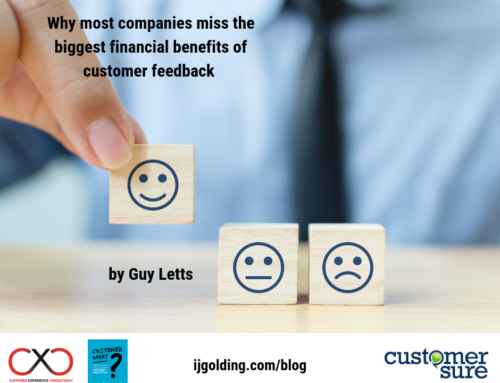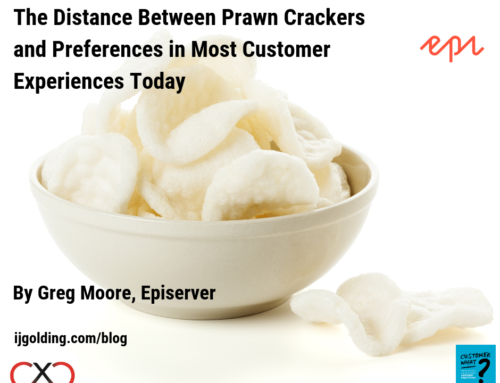
When it comes to the subject of Customer Experience (CX), everyone has an opinion. Differing opinions are not a bad thing – it is incredibly healthy for there to be differing perspectives on all things in this life. Whilst I will not bore you with my personal opinions on staple subjects such as politics (especially in the shadow of Brexit!!) or religion, I will always share my opinions on my favourite subject of all – my vocation – CX!
For many years, I have been of the opinion that there are certain things that organisations all around the world are not doing particularly well when adopting a focus on CX. Perhaps more than anything else, the way they tend to measure CX is failing to provide a truly accurate representation of the truth. When you consider that I am also of the opinion that measurement is perhaps the most important competency of all when it comes to the subject of CX, this is very concerning.
If I am to be completely honest, Voice of the Customer (VOC) measurement is being practised so badly, many are conning themselves into believing they are doing a wonderful job in the eyes of the customer – when the reality could not be further from the truth. There are many, many reasons that sit behind this very significant problem. Among them (in no particular order) are:
- Corporate politics
- Organisational silos
- Gamification
- Differing compensation targets
- Ego
- Ignorance
- Lack of capability
- Lack of investment
You could possibly argue that these are all one and the same thing! I am sure you can think of more! I know I said I would not share my opinions on politics, but I did not mean corporate politics! The overriding reason why organisations are measuring VOC badly, is that leaders are more interested in hitting targets and massaging egos, than they are in genuinely understanding what they key drivers of customer perception actually are. In other words, personal gain is far more important than the collective good of the customer, employee and shareholder.
Transforming corporate politics is NOT easy. Another of my opinions, is that it typically takes between six and eight years to transform a legacy business to become sustainably customer centric – IF that business remains stable!! – there is NO constant change of leadership; NO constant change of strategy; NO constant restructuring. Sadly, there are few legacy organisations that are not doing these things continually.
When you add to this a global corporate culture of businesses wanting to compare themselves with each other – being able to provide numbers that are not necessarily an accurate representation of the truth almost becomes acceptable – as long as they show we are better than everyone else!
Therefore, I pose the following question:
Is the only way to get a measurable representation of truthful VOC, to prevent organisations from actually measuring it themselves?
To bring this question to life, I want to share a new, exciting development in the UK banking industry.
Banks will now have to publish how likely their customers are to recommend them for customer service as part of new measures designed to make it simpler for consumers to compare and switch.
The Competition and Markets Authority (CMA) and Financial Conduct Authority (FCA) said larger banks were not competing enough for customers, leaving consumers missing out – with just 3% of UK personal banking customers switching to a new bank in any given year.
Banks will now have to publish information about their quality of service, overall, in their branches and for their website and apps, and display it in their branches. They will also have to send reminders to customers when making changes such as closing branches or hiking charges.
You can read more about this new development here. For the first time, all UK banks will have their VOC measured completely independently. Even more significantly, the outcome of the bi-annual survey MUST be published for all customers to see.

This is fascinating – and will make worrying reading for the banks towards the bottom of the pile. Whether they like it or not, this is reflective of the truth. The results cannot be massaged. They cannot be gamified. Whether these banks like it or not, this is the most accurate representation of CX they are ever going to get. The study is conducted by research company, GFK – you can find out more about the methodology they are using here.
I am a huge fan of this evolution in VOC measurement – and would be absolutely supportive of the concept being rolled out to as many industries as possible. Even if it is only feasible to do so in regulated industries, if more independently captured and reported VOC becomes a reality, it may help those in unregulated industries to realise that their understanding of customer perception may not be truthful either.
I believe that independent measurement could well be the future for VOC studies around the world. As a CX practitioner, working with organisations to help them genuinely, tangibly, demonstrably improve their customer experience, I can only do so if we are all working with the truth.
My book, ‘Customer What? – the honest and practical guide to customer experience’ – is now available to purchase! You can do so on Amazon.com or Amazon.co.uk. If Amazon does not ship to your part of the world, please complete the form found here and I will arrange an alternative method to ship a book to you. Enjoy the read!!







Great points Ian. Double-blind benchmarking is the only way to go for accurate competitive comparisons. Pleasantly surprised to learn that this has become a requirement for UK banks.
[…] NPS recommendation question as the main score. GfK did the first study. Read Ian’s article here. […]